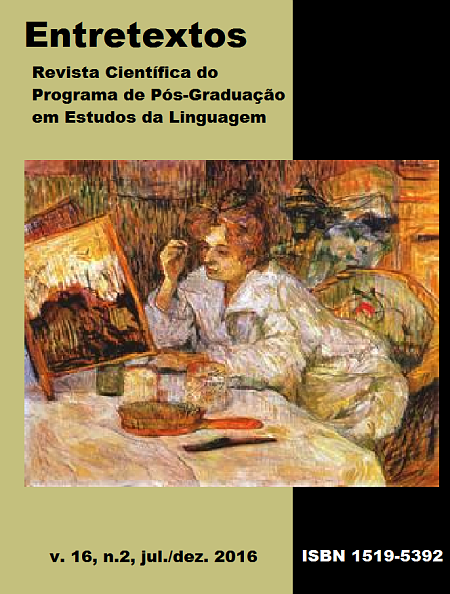The genre "organized debate" in schools
DOI:
https://doi.org/10.5433/1519-5392.2016v16n2p153Keywords:
Organized debate, Speech, Writing, The teaching of portugueseAbstract
This article analyzes a teaching experience involving the organized gender debate, applied in a group of the 3rd grade of high school in the outskirts of Contagem, in Minas Gerais, in 2013. The analysis of the qualitative-interpreting form is based mainly on the studies of Dolz, Schneuwly and Pietro (2004), Pereira and Neves (2012) and of Palma and Cano (2012) and it seeks to contribute to the theoretical and methodological progress in the issues related to the teaching of formal public oral genres, especially in the classroom, a space where it is still a challenge to introduce strategies to work with language that joins oral and written language. Furthermore, linguistic, pedagogical and social implications are assessed as a result of this experience. The outcomes were positive and show that, although they are demanding, the survey of the genre at question can contribute significantly to enlarge the perceptions related to the tenuous limit between formal speech and writing, from the formulation of points of view and arguments, in a authorial way, as well as the recognition of the student as a social subject from is expected to take a stand when he is faced with the issues to act on.Downloads
References
BRASIL. Secretaria de Educação Fundamental. Parâmetros Curriculares Nacionais: terceiro e quarto ciclos do ensino fundamental - língua portuguesa. Brasília, 1998.
COSTA, Sérgio Roberto. Dicionário de gêneros textuais. 2. ed. Belo Horizonte: Autêntica, 2009.
DAYRELL, Juarez. O jovem como sujeito social. Revista Brasileira de Educação, Rio de Janeiro, n. 24, p. 40-52, set./dez. 2003.
DOLZ, Joaquim; SCHNEUWLY, Bernard; HALLER, Sylvie. O oral como texto: como construir um objeto de ensino. In: SCHNEUWLY, Bernard; DOLZ, Joaquim. Gêneros orais e escritos na escola. Tradução e organização de Roxane Rojo e Glaís Sales Cordeiro. Campinas, SP: Mercado de Letras, 2004. p. 149- 185.
DOLZ, Joaquim; SCHNEUWLY, Bernard; PIETRO, Jean-François de. Relato da elaboração de uma sequência: o debate público. In: SCHNEUWLY, Bernard; DOLZ, Joaquim. Gêneros orais e escritos na escola. Tradução e organização de Roxane Rojo e Glaís Sales Cordeiro. Campinas, SP: Mercado de Letras, 2004. p. 247-278.
FIAD, Raquel Salek; MAYRINK-SABINSON, Maria Laura. A escrita como trabalho. In: MARTINS, Maria Helena (Org.). Questões de linguagem. São Paulo: Contexto, 1991. p. 54-63. GERALDI, João Wanderley (Org.). O texto na sala de aula. Cascavel: Assoeste, 1984.
GERALDI, João Wanderley. Portos de passagem. 4. ed. São Paulo: Martins Fontes, 1997. (Texto e Linguagem).
GNERRE, Maurizzio. Linguagem, escrita e poder. São Paulo: Martins Fontes, 1991.
KOCH, Ingedore Villaça. A inter-ação pela linguagem. 10. ed. São Paulo: Contexto, 2010.
MARCUSCHI, Luiz Antônio. Da fala para a escrita: atividades de retextualização. 3. ed. São Paulo: Cortez, 2001.
MIZUKAMI, Maria da Graça Nicoletti. Ensino: as abordagens do processo. São Paulo: EPU, 1986.
PALMA, Dieli Vesaro; CANO, Márcio Rogério de Oliveira. Língua Portuguesa. São Paulo: Blucher, 2012. (A reflexão e a prática no ensino).
PEREIRA, Cilene da Cunha; NEVES, Janete dos Santos Bessa. Ler/falar/ escrever. Práticas discursivas no ensino médio: uma proposta teóricometodológica. Rio de Janeiro: Lexikon, 2012.
XAVIER, Antonio Carlos. Como fazer e apresentar trabalhos científicos em eventos acadêmicos. Recife: Rêspel, 2010.
Downloads
Published
How to Cite
Issue
Section
License
Copyright (c) 2016 Entretextos

This work is licensed under a Creative Commons Attribution 4.0 International License.
Entretextos adota a Licença Creative Commons Attribution 4.0 International, portanto, os direitos autorais relativos aos artigos publicados são do/s autor/es.
Sob essa licença é possível: Compartilhar - copiar e redistribuir o material em qualquer suporte ou formato. Adaptar - remixar, transformar, e criar a partir do material, atribuindo o devido crédito e prover um link para a licença e indicar se mudanças foram feitas.























